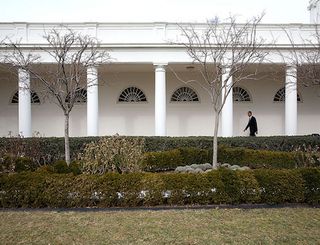White House Hammers FCC-Targeted Appropriations Riders

The Obama Administration signaled Tuesday that the President will almost certainly veto a House appropriations bill if it includes a variety of riders, including ones blocking the FCC's net neutrality rule enforcement and a vote on its set-top box proposal.
In a statement of Administration policy, the Office of Management and Budget said that it strongly opposes H.R. 5485, the Financial Services and General Government Appropriations Act of 2017.
OMB has many issues with the bill, including Republican riders meant to reign in FCC regulatory efforts.
OMB said it opposed the $53 million (14%) cut in FCC funding, which it said would "force FCC to scale back important work on public safety and wireless spectrum, delay efforts to modernize IT systems, and undermine efforts to save the taxpayers money by consolidating office space and improving oversight of the Universal Service Fund."
One rider would allocate no funds for enforcement of FCC Open Internet rules until the court challenges to those rules have been exhausted--that could stretch into 2017 given plans to challenge the D.C. appeals court decision upholding the rules to the Supreme Court.
President Obama publicly pushed the FCC to reclassify ISPs as Title II telecoms, a decision the court upheld.
OMB said it strongly opposed efforts to block enforcement of the Open Internet order.
Broadcasting & Cable Newsletter
The smarter way to stay on top of broadcasting and cable industry. Sign up below
"The order, which was issued after a lengthy rulemaking process that garnered input from four million Americans, ensures a level playing field that is increasingly vital to the future of the Nation's digital economy and online competition," OMB said. "For almost a century, U.S. law has recognized that companies who connect Americans to the world have special obligations not to exploit the monopoly they enjoy over access in and out of Americans' homes or businesses. It is common sense that the same philosophy should guide any service that is based on the transmission of information—whether a phone call, or a packet of data. The FCC's rules recognize that broadband service is of the same importance, and must carry the same obligations as so many of the other vital services do. These carefully-designed rules have already been implemented in large part with little to no impact on the telecommunications companies making important investments in the U.S. economy, and would ensure that neither the cable company nor the phone company would be able to act as a gatekeeper, restricting what Americans can do or see online. The appropriations process should not be used to overturn the will of both an independent regulator and millions of Americans on this vital issue."
Another rider would pause the FCC's set-top proceeding until completion of impact studies, something legislators from both parties have called for.
The White House has supported that effort publicly as well. OMB said it opposed the provision "that aims at delaying the FCC from adopting or enforcing new rules to open the video set-top box market to additional competition. Currently, 99%of cable and satellite TV consumers rent set-top boxes directly from the cable providers, costing households an average of $230 per year," it said, echoing the stats FCC Chairman Tom Wheeler has repeatedly offered up as evidence of the need for opening set-top programming and data to third parties.
OMB did not exactly endorse the proposal, but did say that Congress should not throw a wrench into the process of considering and debating it. "The FCC is already committed to a lengthy, thorough rulemaking process that would establish a robust record of comment and analysis from companies, non-profit organizations, and academics. The current provision unnecessarily interferes with these long-established processes by requiring a delay of at least 270 days, and probably much longer, and a redundant, potentially costly study."
Contributing editor John Eggerton has been an editor and/or writer on media regulation, legislation and policy for over four decades, including covering the FCC, FTC, Congress, the major media trade associations, and the federal courts. In addition to Multichannel News and Broadcasting + Cable, his work has appeared in Radio World, TV Technology, TV Fax, This Week in Consumer Electronics, Variety and the Encyclopedia Britannica.

